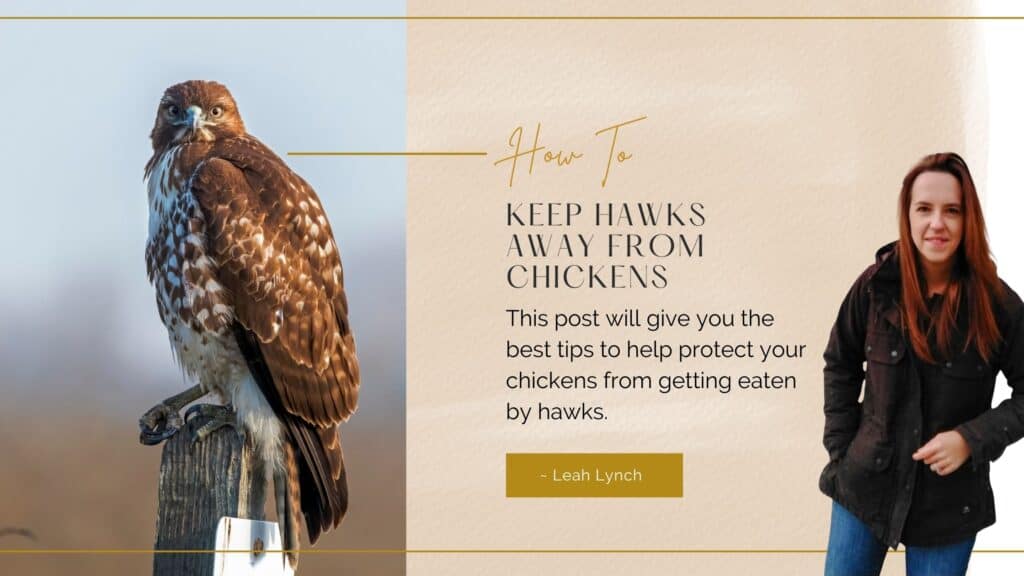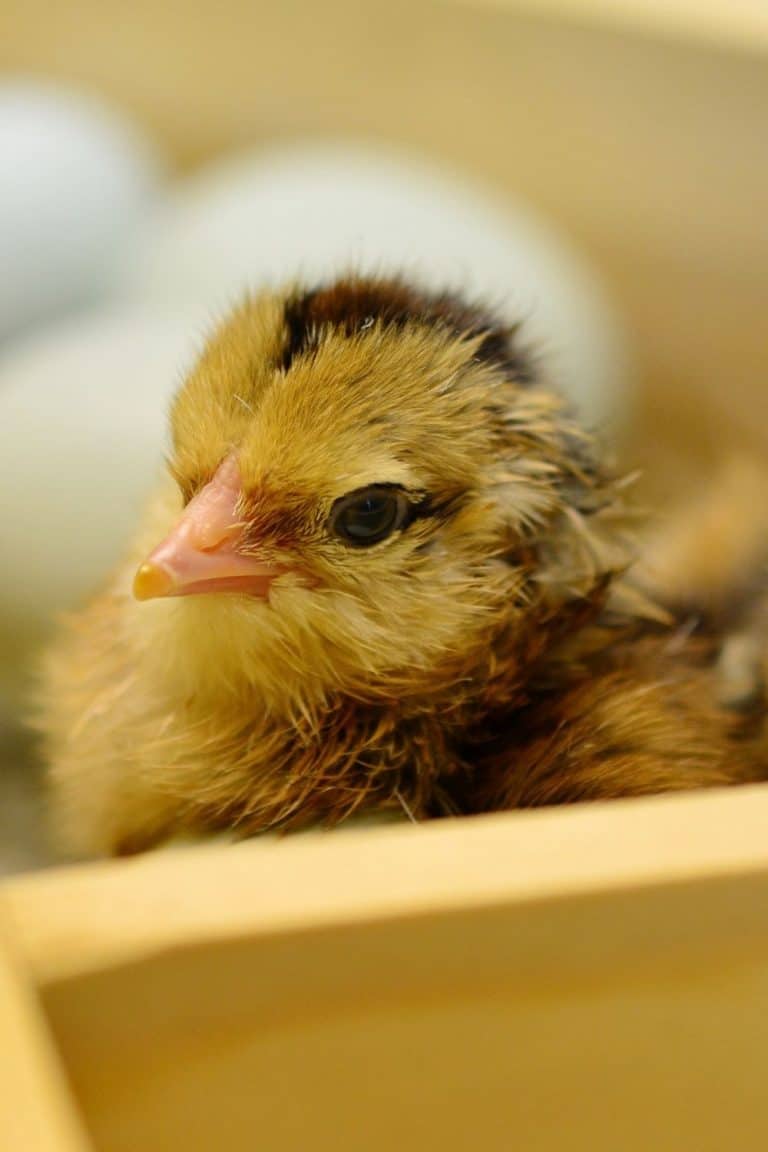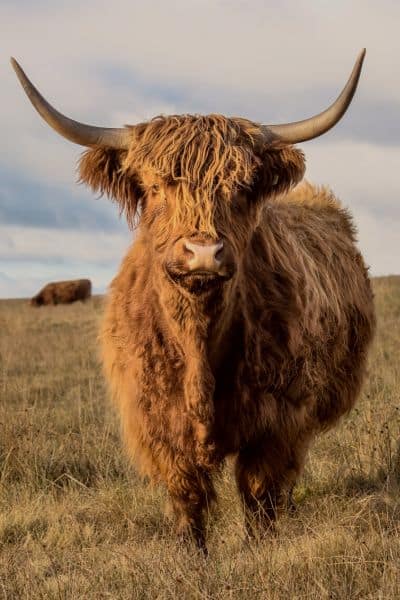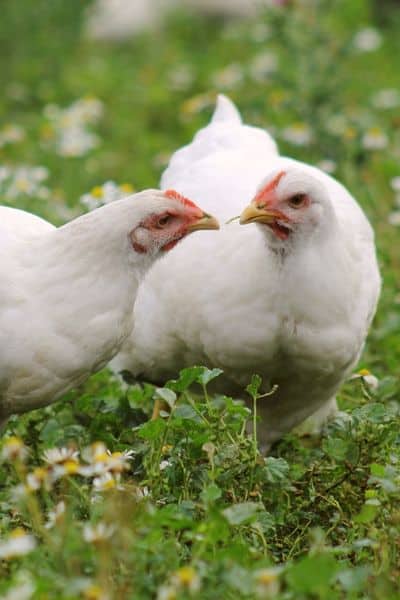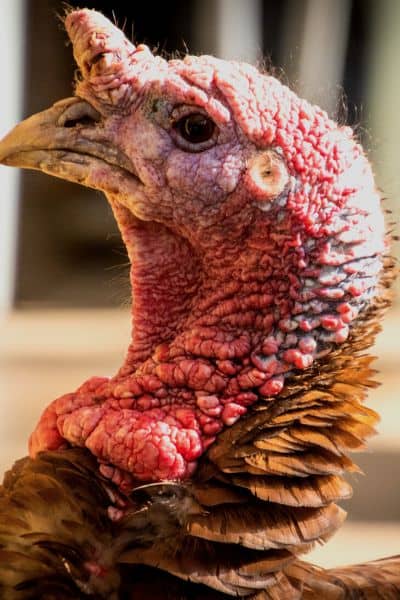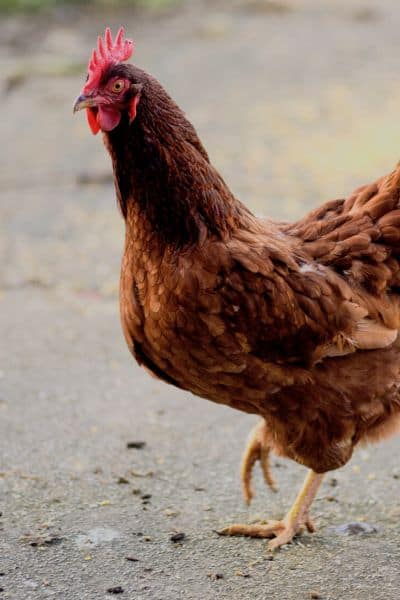From Prey to Protected: How To Keep Hawks Away From Chickens Your Ultimate Guide
Oh my goodness. Hawks and chickens… 🙄You don’t have to deal with them too often but once you have a hawk that has decided to take up residence around your property you are going to have issues until you deal with it.
Learning how to keep hawks away from chickens takes practice.
The best thing for you to learn how hawks typically behave and when they are likely to come after your chickens.
But I am going to be honest. If you have free-range chickens on a piece of land without chicken wire or some kind of covering over the top. You run the risk of having a chicken hawk come and get them. It’s just that simple.
Chickens are a great source of food for your family, but they are easy targets for aerial predators as well as other natural enemies like coons.
One thing I want to say before I get into these tips.
You have EVERY RIGHT to protect your livestock. Let me say that again for the people in the back.
You have every right to protect your animals.
Yes, it may be the circle of life thing but they are your responsibility and you wouldn’t let a stranger come into your home uninvited. Same with the hawks or any other wild animal that plans to do harm to your flock. So don’t feel bad about whatever form of pest control you choose.
How To Spot A Hawk
You will see a hungry hawk mostly in rural open areas. They are not so much an issue for backyard chickens in town. They are often sitting on telephone wires or fence polls watching for food. Sometimes they will eat small birds but mostly they are watching for mice or other small ground animals.
If you are watching over your free-range chickens keep an eye on the outer edges where a hawk could be watching from while still staying hidden. This is where you are most likely to spot those chickentender-loving pests.
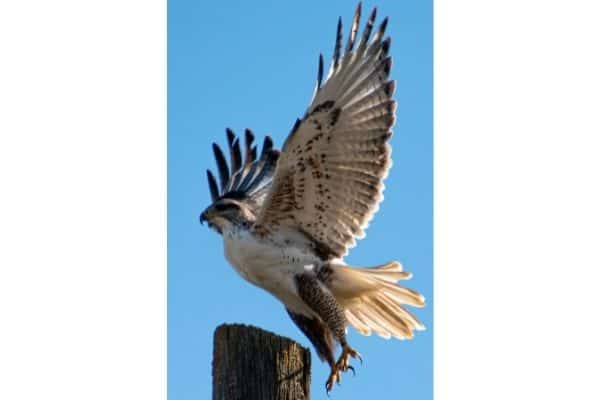
Get Rid Of Vantage Points For Stalking
Hey there! So, if you’ve been noticing hawks hanging around your property and keeping an eye out for potential prey, it’s important to take action to deter them from using vantage points for stalking. Hawks often like to perch on tall trees, high fences, and utility poles to keep an eye out for small animals to swoop down on.
One way to address this issue is to eliminate as many vantage points as possible. This can be done by cutting down trees or removing dead branches that hawks like to hang out on. Additionally, you can install anti-bird spikes on fences and utility posts to make it less inviting for hawks to perch and stalk from those vantage points.
By taking these steps, you can help reduce the likelihood of hawks targeting small animals on your property. And remember, it’s important to do so in a way that is safe for both the hawks and the other wildlife in your area.
So, take a look around your property, identify the vantage points that hawks are using for stalking, and take action to eliminate them by installing anti-bird spikes and trimming back any trees or branches that are providing those perfect perches for the hawks.
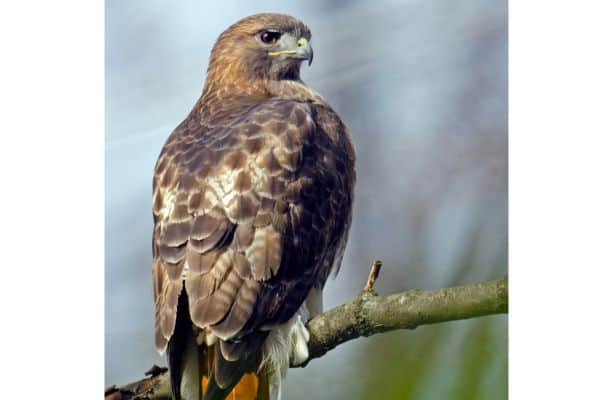
Learn How Hawks Behave
Hawks are fascinating birds of prey known for their incredible hunting abilities. With their sharp eyesight, powerful talons, and keen sense of smell, they are skilled hunters in their natural habitat. Hawks are known for their distinctive hunting patterns, often soaring high in the sky before swooping down to catch their prey with precision.
With their predatory instincts, hawks target a variety of small animals for food, including rodents, snakes, and even other birds. However, they are also known for preying on chickens, making them a concern for poultry owners. Their ability to swiftly grab and carry off their prey with their strong talons makes them a formidable predator for chickens.
When it comes to understanding hawks, it’s important to recognize their natural behavior and hunting patterns. By being aware of their instincts and behavior, people can take appropriate measures to protect their chickens from potential hawk attacks.
It’s crucial to respect the role hawks play in the ecosystem while also taking steps to minimize any negative impact on livestock. Understanding their behavior can help in finding a balance that allows these majestic birds to thrive while also ensuring the safety of domestic animals.
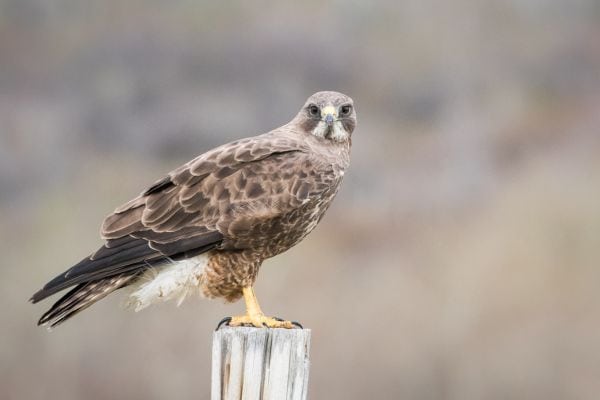
Decrease The Hawks Assessability to your chickens
To keep your chickens safe from hawks, there are a few simple but effective ways to decrease the hawks’ accessibility. Start by trimming tall trees and bushes near the coop to reduce perching and hiding spots for the hawks. Installing predator-proof fencing around the coop and run can also help keep your chickens secure.
Another deterrent is to use decoy predators or reflective objects to deter hawks from coming too close to the coop.
You can also provide covered areas in the run for the chickens to hide in case a hawk does appear. Additionally, utilizing noise deterrents such as wind chimes or a scarecrow can help keep hawks at bay. By implementing these strategies, you can create a safer environment for your chickens and reduce their vulnerability to hawks.
Free Farm Goal Planner!!!
➡️Get my proven system for choosing your farm goals so you don’t get burnt out.
Most Likely Seasons For Hawks To Attack
Hawks are known to be opportunistic predators, and backyard chickens can be on their radar, especially during certain seasons. Spring and early summer are the most likely times for hawks to attack, as this is when they are nesting and feeding their young. During this time, hawks become more territorial and protective of their nests, and they may see backyard chickens as a potential food source for their growing chicks.
As the seasons change, so does the behavior of hawks. In the fall, hawks are preparing for the winter months and are often on the lookout for easy prey. This can make chickens more vulnerable during this time, as hawks may be more active in searching for food to build up their reserves for the colder months.
The impact of seasonal changes on hawk behavior directly affects the vulnerability of backyard chickens. It’s important for chicken owners to be aware of these patterns and take necessary precautions during these times to protect their flock.
By understanding hawk behavior, nesting habits, and feeding patterns, chicken owners can better prepare for the increased vulnerability of their chickens during certain seasons. Taking proactive steps, like providing cover and ensuring secure coops, can help keep chickens safe from potential hawk attacks.
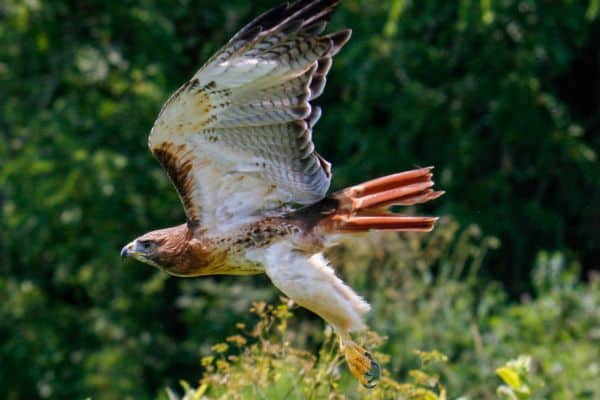
Be unpredictable when doing the farm chores
Completing farm chores may seem straightforward, but there’s actually a strategic aspect to it as well. When it comes to keeping our chickens safe from hawks, being unpredictable is key. By mixing up the timing and order of tasks like feeding, cleaning, and milking, we prevent any predictability that hawks might rely on when they think the chickens will be unattended.
If we stick to a routine, hawks can easily anticipate when our chickens are most vulnerable. However, by being unpredictable, we keep them guessing and prevent complacency from setting in. This simple tactic can make a big difference in the safety and well-being of our flock.
So next time you’re doing farm chores, remember the importance of mixing things up. Even small changes in your routine can help keep our chickens safe from predators, and that’s something we can all work towards. Do your best to keep things unpredictable, and our feathered friends will thank you for it!
Fake Owl
The idea behind this is that hawks and owls do not hang out in the same territory. While one hunts at night and the other by day they simply don’t get along. So having an owl decoy will cause a hawk to think twice.
Roosters Are A Flocks Alert System For Predators
Roosters are like the guardians of a flock of chickens, always on high alert to keep their hens safe from predators. They serve as an alert system by actively scanning the area for any signs of danger. When a rooster spots a potential threat they immediately issue alarm calls to warn the hens and gather them to safety.
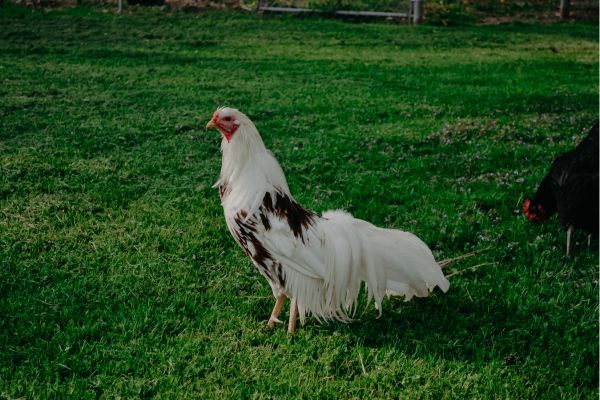
Roosters have been known to scare off predators however this is a catch twenty-two. If the rooster is going to protect the flock he typically has to be a bit more energetic and has a more challenging nature.
BUT that leaves you with a rooster that is likely to challenge you and your family as well. — Which is not cool either. So be willing to remind any roosters you have who’s boss and that coming after humans isn’t tolerated.
They do make great guard animals against a bird of prey but make sure you are careful about the rooster you bring into your flock so you don’t have one that makes you afraid to go into your own back hard.
Keeping Bait Birds To Protect Your Laying Hens
Ok so if you are a little mushy-hearted you may not like what I am about to say. I got the idea in the spring of 2022 to keep bantam chickens mixed in the flock of standard birds as “bait birds” to keep the predators from going after the laying hens.
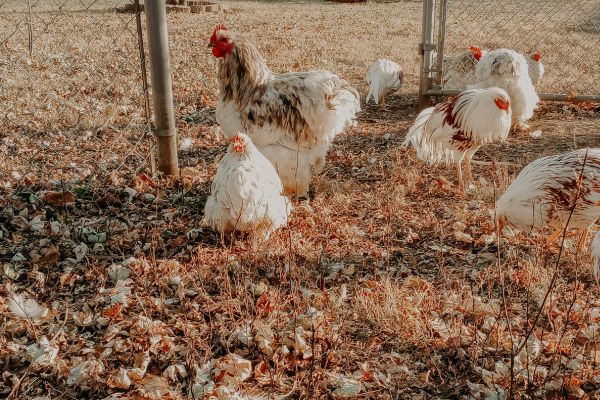
If you think about it all predators go after the easiest target. Which do you think they are going to go after first? The 8-10 pound bird or the little 2-pound bantam that looks like less of a challenge.
It’s not exactly a pretty thought but it’s been working for us for over a year. It keeps your birds with a purpose from getting eaten.
Provide Cover to Protect Chickens From Hawks
If you’ve got some trees nearby, use them to create a barrier between your chickens and any potential predator. Trees offer protection against windy conditions and help keep out rainwater, making them ideal shelter for your birds. You could also install bird netting along fence lines to prevent hawks from accessing your property.
Cover Your Chicken Run To Protect Chickens From Hawks
A chicken run is a fenced-in area that connects to the chicken coop. They enable you to be able open the chicken coop door and let the chickens have some space to roam but they will not be running loose around the entire open area and get into trouble.
Having a covered chicken run is the best way to keep them contained and safe from a hawk attack.
Buuuuttt it’s not always realistic for most people…. If you have nothing covering the run, then a board over part of the run or temporary covering will do for now. Chickens naturally run for cover when they feel threatened. Tall trees are another great option to help protect your flock from predatory birds.
Hawks like to fly into an open area and leave quickly so brush and other types of cover will help deter them from your chickens.
If you do have a small enough space where adding a covering over the chicken yard is an option, make sure there are no gaps between the covering and the fence walls. A determined animal will find its way through.
Have Netting Over The Chicken Run
Protecting your chickens from predatory birds is essential for their safety. Installing netting over the chicken run is a simple and effective way to provide extra protection.
To start, you’ll want to use either deer netting or fishing line to act as a visual deterrent for hawks. This will prevent them from swooping down on your chickens. Be sure to securely fasten the netting to the top of the chicken run to ensure it stays in place.
Regularly checking the netting for any damage is crucial to maintain its effectiveness. Any tears or weak spots should be promptly repaired to keep your chickens safe from predatory birds.
By following these steps and ensuring a secure installation, you can provide your chickens with the added protection they need. With the netting in place, you can have peace of mind knowing that your feathered friends are safe from any potential threats.
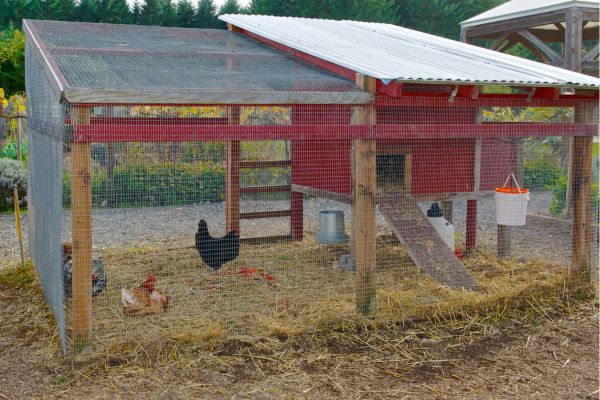
Plant Shrubs For Cover
Choosing and planting shrubs and bushes around your backyard chicken coop is an important step in providing protection for your feathered friends. When selecting shrubs, consider the height and density of the plants to ensure they offer sufficient cover from aerial predators like hawks and owls. Look for bushes that are tall and thick enough to create a natural barrier around the coop.
When planting the shrubs, consider the location and spacing to maximize coverage and create a protective perimeter. Plant the shrubs strategically, ensuring they are positioned close enough to offer cover but not too close to the coop, as this could attract pests. Additionally, choose plants that are non-toxic to chickens in case they nibble on them.
Some great options for shrubs and bushes to consider include cypress, juniper, and holly. These plants are not only visually appealing but also provide excellent cover and protection for your chickens. By carefully selecting and planting shrubs and bushes, you can create a safe and natural environment for your backyard coop.

Don’t have your feeders out in the open
Your chickens are more vulnerable while they are eating. Their heads are down and they are not paying attention to what is above them. Having your chicken feeders out in the open can make your chickens vulnerable to attacks from predators including the red-tailed hawk.
The hawks are extremely smart and will watch the feeders and wait for the perfect time to strike. At feeding time there are often multiple birds there at one time leaving multiple targets.
To keep your chickens from being an afternoon snack, it’s important to move your feeders and waterers inside a covered feeding station, enclosed structure, or under brush or a tree. This will provide them with a secure place to eat and drink with less risk of attack.
If you don’t have a feeding station, you can also place the feeders inside your coop to provide added protection. By doing so, you can help ensure that your chickens can enjoy their meals without the fear of becoming prey.
Add Some Reflective Materials To The Chicken Area
Shiny things are supposed to keep hawks away. Personally, I have not tried these ideas so stick with me. I tend to go with ideas I am sure will work. Like keeping them covered and using more permanent methods of getting rid of the hawks. So there’s that.
Here are some shiny objects you can put up that will help.
- Old CDs
- Reflective tape
- Fishing line
- Old mettle pie pans
- Disposable baking pans.
- Windchimes
The main idea with this is to put something up that will make them hesitant to come into the area. These are smart birds and I have seen birds catch on that something doesn’t move from the one spot and come down from their watch anyway.
Keep Your Chickens In The Coop To Protect Them From Hawks
One great way to keep your chickens safe and secure is by building a chicken tractor, chicken tunnel, or a chicken coop with a covered chicken run. These structures provide a designated space for your chickens to roam while also keeping them protected.
This may not be what you had in mind when you first got chickens but it’s a trade-off. If you don’t want to ever lose a chicken to a predator then they have to be closed up.
Or if you want them to be free roam all the time then you run the risk of them getting eaten. So you have to decide which you would rather have.
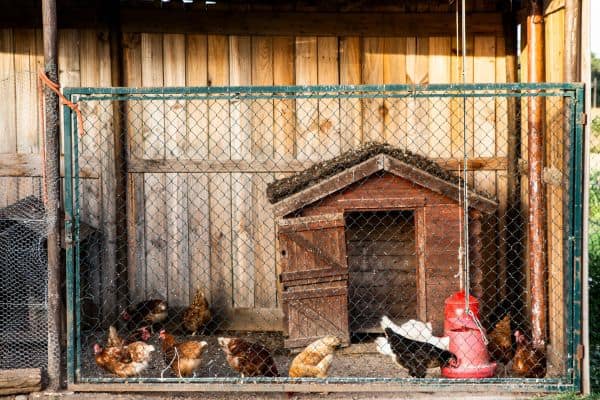
Guard dogs can be useful for flocks if you choose the right breed
When looking for a guard dog breed for poultry and livestock protection, it’s important to consider certain characteristics and traits. Look for a breed that is large, strong, and naturally protective, with enhanced capabilities to guard your flock effectively. Breeds like the Great Pyrenees are known for their good guarding instincts and can be a great choice for protecting your poultry and livestock.
However, it’s also crucial to be cautious when selecting a breed, as some dogs with strong herding instincts can end up accidentally killing birds. It’s important to watch out for breeds like the Border Collie or Australian Shepherd, which may not be the best choice for protecting your flock.
I see this all the time in facebook groups where people think that all dogs will guard “their property”….. um no. Not all dog breeds are the same. Each breed group was meant for different things.
This will leave chicken owners very disappointed when the dog scares their flock. Or even bites at the bird ultimately killing it. This is what herding dogs are wired to do. Next to you, they are the boss and they are going to make that animal do what ever they want it to do. So we can’t be mad at them for doing what they were made to do.
A Goat Instead Of A Dog
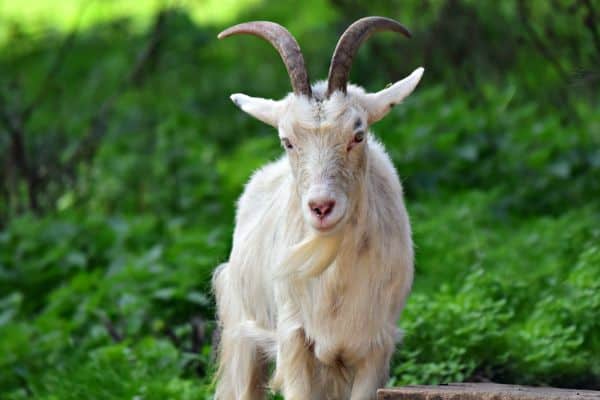
Everyone loves a good excuse to get a goat…🤣
I met a local chicken raiser here in our area and he had a goat in with his birds. His theory was the hawk didn’t know if it was a dog or not so he never had any trouble. So if this is an option for you it might be worth trying out.
Crows And Hawks Don’t Get Along
Crows and hawks don’t get along. Crows are known to be territorial, and they don’t take kindly to hawks encroaching on their territory. They will often work together to drive off a hawk that might be hunting in the area.
It’s believed that the crows can actually deter hawks from sticking around because they will harass and dive bomb the hawk to make it leave the area. This can be beneficial for backyard chicken owners, as hawks are known for preying on small animals like chickens.
While I don’t think the presence of crows will 100% keep hawks away I do think they are a great help in moving hawks along. — At our old property we had A TON of crows around and I saw firsthand how crows will work together to get rid of a hawk.
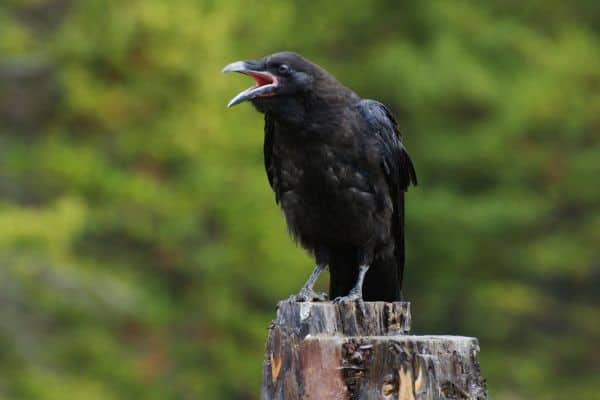
Interestingly, there’s a belief that hawks won’t attack black chickens because they mistake them for crows. While this might not always be the case, it’s still an interesting thought that adds to the dynamic between these two bird species in a backyard environment.
Either way, if you have crows in your backyard, you might just find that they are helping to keep any potential hawk threats at bay. And if you happen to have black chickens, it could be an added layer of protection against any nearby hawks.
Don’t Know Where To Start With Your Backyard Farm?
Its time to start a backyard farm that fits YOUR dream lifestyle, Backyard Farm Foundation is the answer to setting a clear plan and achievable goals for starting your dream backyard farm or homestead.
ONLY $9!!!!
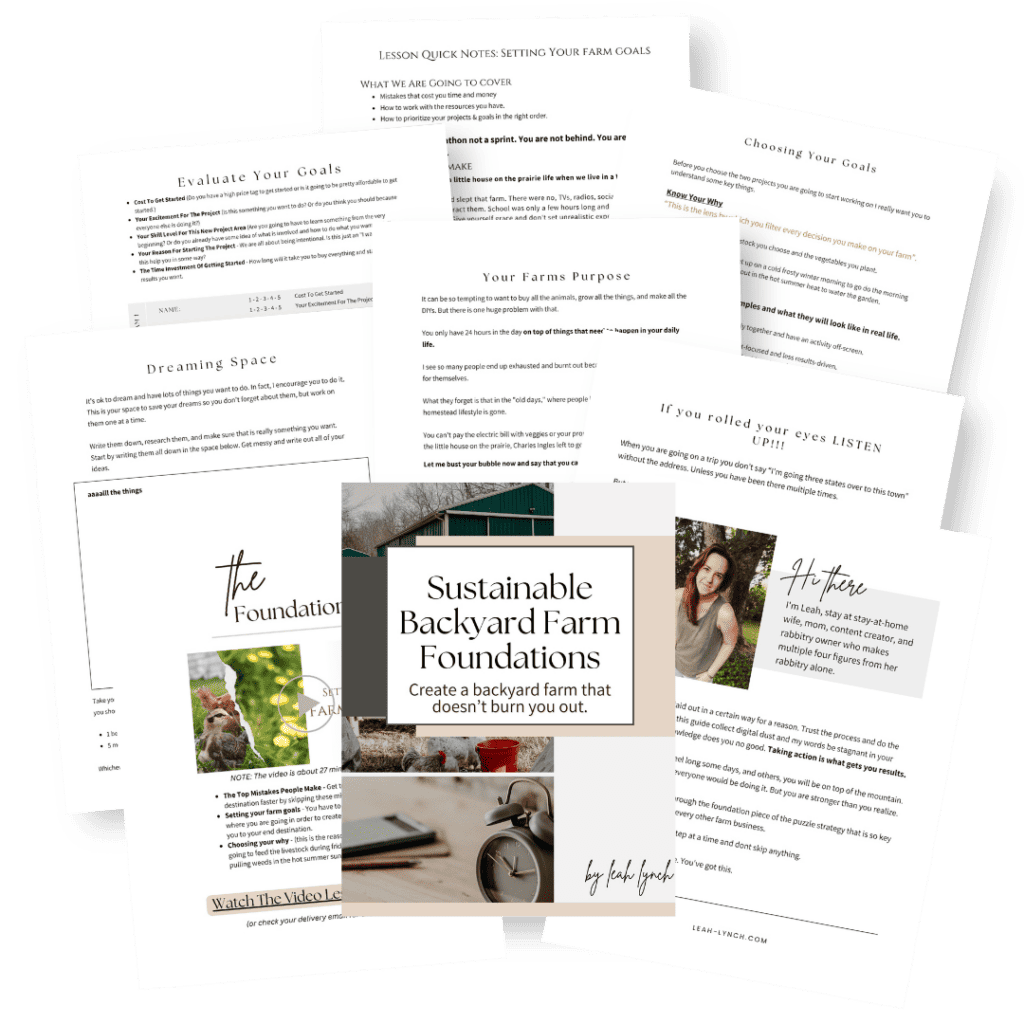
My Personal Run-ins With Hawks
All total we have had a run-in with 6 or so Hawks in 8ish years. The first one was extremely bold. I look out our bedroom window to see the hawk sitting on our four-foot chainlink fence watching the flock right in the middle of everything.
Another was going after some baby chicks (yes chicken chicks not ducklings) our duck hatched out… that’s a story for another time. Man, was that duck brave. She was not going to let that hawk have her babies.
The most recent one I was walking back from getting the mail and I noticed a bird with its tail going down to the ground ( not up like a chicken) out of the corner of my eye. I quickly realized it was a hawk.
I ran inside to get what I needed to deal with it quickly (you imagine what you want to here) and realized it was a young and inexperienced bird. — The way it came after the birds was so obvious and it tried multiple times to get a chicken and failed every time.

There Are Lots Of Ways To Deter Hawks From Chickens
Hawks can be a common threat to backyard chickens, but there are some simple tactics you can use to help protect your flock. By using a combination of preventative measures and deterrents, you can keep your chickens safe from these aerial predators.
Unfortunately losing chickens to larger birds of prey is part of being a poultry owner. Unless you never let the chickens free-range and you coop them up in electric fences all the time. All you can only do what you can and hope for the best.
